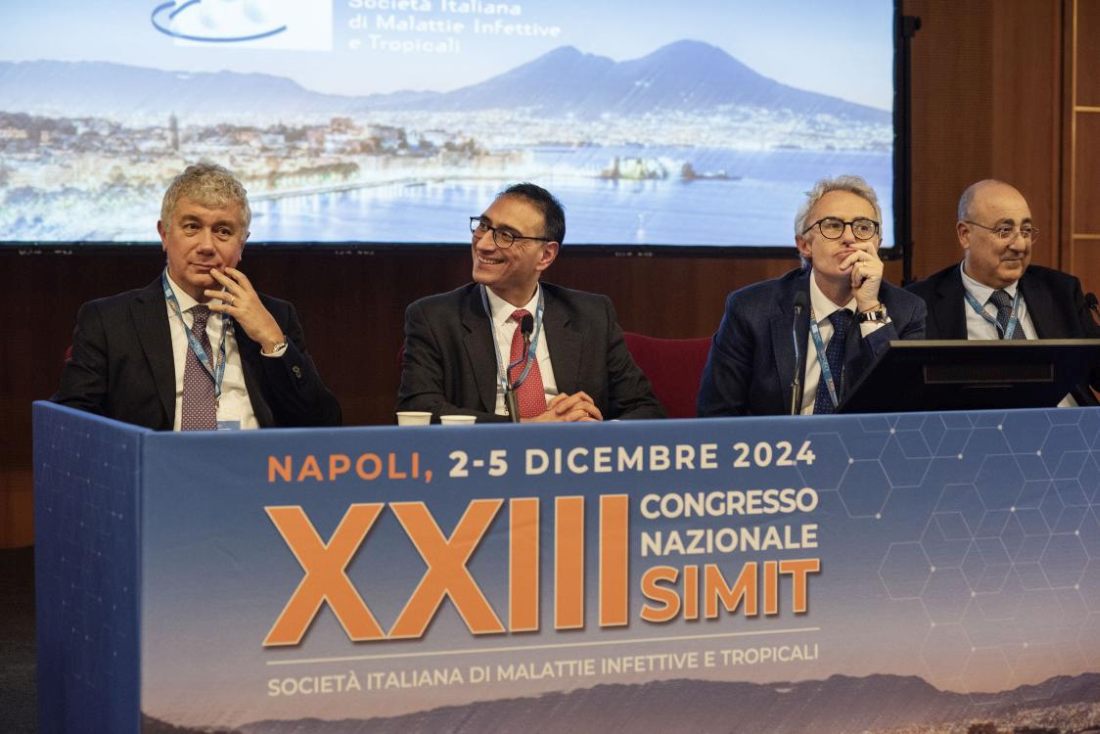NAPLES (ITALPRESS) – Important news from the XXIII Congress of the Italian Society of Infectious and Tropical Diseases – SIMIT held in Naples. Among the main topics were antibiotic resistance and care-related infections, vaccination in the adult and frail person, Covid-19 in the immunocompromised, new therapies and prophylaxis strategies for HIV, management of the hepatitis underground, climate change and arbovirosis. With SIMIT National President Roberto Parrella, Nicola Coppola, Full Professor of Infectious Diseases, University of Campania; Vincenzo Esposito, Director UOC Infectious Diseases and Gender Medicine Hospital Cotugno – AO dei Colli, Naples; Ivan Gentile, Full Professor of Infectious Diseases, University of Federico II, Naples, organized the event.The opening of the Congress was attended by the mayor of Naples Gaetano Manfredi and Maria Rosaria Campitiello, head of the Department of Prevention, Research and Health Emergencies of the Ministry of Health, testifying to the network developed by infectiologists with institutions. Moving was the testimony brought by writer Maurizio De Giovanni. In the concluding talk show, a new interaction between clinicians and institutions, with Councillor for Social Policies and Labor of the City of Naples Mariarca Viscovo, who emphasized the city’s commitment to combating the new challenges of infectiology. Video messages from Undersecretary for Health Marcello Gemmato and the Honorable Gian Antonio Girelli testified to the close network built by SIMIT with institutions. “After the last few years marked by the fight against COVID-19, in which infectivologists have demonstrated organizational capacity and professional competence, we are now facing new challenges that must find us equally prepared,” stressed Roberto Parrella, SIMIT national president. “Great attention will be paid to antimicrobial resistance and care-related infections, a cogent issue as also emerged in the recent G7 Health. Within the SIMIT Congress, there were several sessions dedicated to infection control and antimicrobial stewardship, addressed from the One Health perspective, a holistic approach between human, animal and environmental health. “Antibiotic resistance (AMR) remains a major public health threat globally. Data from the Resistimit project concretely highlight the risk of mortality from these antibiotic-resistant microorganisms.”To date, there are 45 centers operating in the Resistimit platform, while 800 patients affected by severe infection with gram-negative bacteria are analyzed in the database,” explains Marco Falcone, SIMIT Councilor and Resistimit project manager. “Mortality data in Italian hospitals stratified by pathogen show a 30-day probability of death that can range from 10 percent of the least resistant bacteria up to 40 percent, in the case of microorganisms that have become epidemiologically more relevant such as Acinetobacter baumannii and carbapenemics-resistant Enterobacteria. In other words, some hospital-acquired infections result in a high probability of death. We are working to understand which patients are most at risk and any diseases that make the individual more vulnerable. Resistimit is the first project to offer concrete experience on the clinical impact of antimicrobial resistance, the effects of which on human lives are lacking full perception. This may form the basis for further insights and possible prevention policies. A first result that we can report is the necessary presence of an infectivologist in every hospital to monitor the problem. “High antibiotic consumption contributes significantly to the increase in antimicrobial resistance,” Ivan Gentile emphasizes. “However, it is estimated that nosocomial infections can be reduced by 30 percent by doing more prevention in hospitals and reducing antimicrobial consumption. In practice, between 135 and 210 thousand nosocomial infections could be avoided, with benefits in terms of fewer deaths and considerable economic savings. “On the subject of HIV, there have been new successes of antiretroviral therapy in virus suppression and Pre-Exposure Prophylaxis. Indeed, thanks to these treatments, HIV infection can be chronicized ensuring survival and quality of life increasingly similar to the general population. In addition, regular intake of therapy allows the virus to become nontransmissible, as noted by U=U (Undetectable=Untransmittable) scientific evidence. The most recent developments open up further perspectives, with the possibility of long-term prevention and less inflammation of the immune system. The extraordinary results achieved with antiretroviral therapy also allow the evaluation of different treatment options based on patient characteristics.”Recently, the opportunity has emerged to individualize treatment with two-drug therapy instead of three, but both strategies have specific advantages, to be evaluated on a case-by-case basis,” explains Giovanni Di Perri, Full Professor of Infectious Diseases, University of Turin. “The three-drug therapy Bictegravir + Emtricitabine + Tenofovir Alafenamide represents the highest point of development in each category (long half-life, intrinsic potency, forgiveness), with potency and tolerability levels such as to cope even with less than perfect adherence. A 20% non-adherence, for example, which in the past could cost therapeutic failure, now becomes sustainable with this therapy. These data should lead us to evaluate the benefits of triple therapy in designing an individualized and precise treatment for the person with HIV.””Among the most widely used antiretroviral therapies, that with BIC/FTC/TAF has shown in various clinical trials great efficacy in reducing some inflammatory markers and improving the functioning of the immune system,” explains Giulia Marchetti, Full Professor of Infectious Diseases University of Milan, San Paolo Hospital – This result represents a big step forward in the administration of antiretroviral therapy, as these molecules allow people with HIV, especially when they start therapy early with a still robust immune system, to maintain a good quality of life and survival similar to that of the general population.””In addition, prevention is possible in individuals who are uninfected but at high risk of becoming infected,” stresses Massimo Andreoni, Simit scientific director. “There is no vaccine, but antiretroviral therapies have been shown to be extremely effective in Pre-Exposure Prophylaxis (PrEP). The latest advances in research have given us a drug that is administered every two months; in the near future we will have a drug that can extend protection up to six months.”
– photo Margherita Mirabella provided by Diessecom –
(ITALPRESS).

